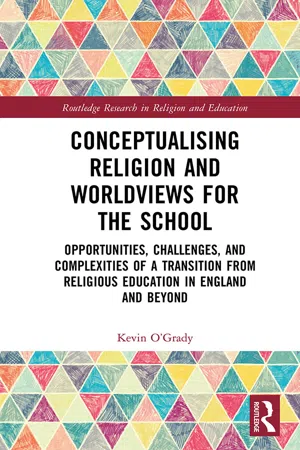
Conceptualising Religion and Worldviews for the School
Opportunities, Challenges, and Complexities of a Transition from Religious Education in England and Beyond
Kevin O'Grady
- 196 pagine
- English
- ePUB (disponibile sull'app)
- Disponibile su iOS e Android
Conceptualising Religion and Worldviews for the School
Opportunities, Challenges, and Complexities of a Transition from Religious Education in England and Beyond
Kevin O'Grady
Informazioni sul libro
This timely volume addresses current debates surrounding the transition from the teaching of religious education (RE) to the more holistic subject of Religion and Worldviews (R&W) in England, and posits criteria for best practice among educators in varied settings and in a broader international context.
By examining empirical sources, governmental reports, and in particular the 2018 final report from the Commission on Religious Education (CORE), the volume suggests key principles needed to guide the transition and ensure that R&W is effectively integrated into curricula, pedagogy, and teaching resources to meet the needs of all student groups. By effectively conceptualising R&W, the volume gives particular attention to the intersections of the subject with democratic citizenship education, intercultural competence, and religious literacy.
This text will benefit researchers, academics, and educators with an interest in religious education and teacher education as well as the philosophy and sociology of education more broadly. Those interested in education policy and politics, as well as citizenship and schooling in the UK, will also benefit from this volume.
Domande frequenti
Informazioni
Chapter 1
The Core Report
Background, Content, and Reception
“We offer a new vision. The subject should explore the important role that religious and non-religious worldviews play in all human life. This is an essential area of study if pupils are to be well prepared for life in a world where controversy over such matters is pervasive and where many people lack the knowledge to make their own informed decisions. It is a subject for all pupils, whatever their own family background and personal beliefs and practices. To reflect this new emphasis, we propose that the subject should be called Religion and Worldviews.”1
The Content of the CORE Report
The Need for Change
- Despite its requirement, many English schools, particularly academies, provide no RE at Key Stages 3 (11–14 years) and 4 (14–16 years). In 2016, 33.4% of schools offered no RE at Key Stage 4 and 23.1% offered none at Key Stage 3. The percentage of schools without a religious character offering no RE at Key Stage 4 (38.9%) was almost four times that of schools with a religious character (11.2%).11
- Survey data suggest that nearly 30% of primary schools surveyed offered less than 45 minutes of RE per week.12
- The quality of RE is ‘highly variable’: the most recent Office for Standards in Education subject review (2013) “found RE to be to be less than good in just under half of secondary schools and in six out of ten primary schools observed.” In Church of England schools, a 2014 report is cited to have found RE to be good or better in 70% of secondary schools, but 40% of primary schools.13
- In secondary schools, more than twice as many teachers of RE (53.6%) as History (25.3%) have no relevant post A-level qualification in the subject. Almost three times as many lessons in RE (24.2%) as History (8.8%) are taught by a teacher with no relevant post A-level qualification. In primary schools, over 60% of recently qualified teachers had received fewer than three hours of subject specific RE-related training in their initial teacher education course.14
- Schools becoming academies outside local authority control, together with funding cuts, have reduced local authority support for RE to the extent that it is disappearing in some localities and cannot be sustained in others; changes to the inspection regime (with individual subjects no longer being inspected) and the exclusion of RE from the English Baccalaureate, a measure of school performance at Key Stage 4, have removed incentives for schools to provide high quality RE.15
- Support for RE is much more stable in schools of a religious character. It is inspected as a specific subject, a much greater amount of professional advice is offered from diocesan or other authorities, and faith schools take up more professional development activity such as gaining a quality mark for RE.16
Indice dei contenuti
- Cover
- Endorsements
- Half Title
- Series Page
- Title Page
- Copyright Page
- Table of Contents
- About the Author
- Foreword
- Preface
- Acknowledgements
- Introduction: Religion, Worldviews, and Education: Opportunities, Challenges, Complexities, and Position
- 1. The Core Report: Background, Content, and Reception
- 2. Religion, Worldviews, and Education for Democratic Citizenship: Perspectives from beyond England
- 3. Religion and Religions
- 4. Worldview and Worldviews
- 5. Religion and Worldviews within RE
- 6. Religion, Worldviews, Knowledge, and Disciplines
- 7. Well-Being and the Public Good: Education, Religion, and Worldviews
- 8. Religion and Worldview Literacy
- 9. Big Ideas and the Challenge of Curriculum Design
- 10. Review, Reflections, Recommendations
- Index